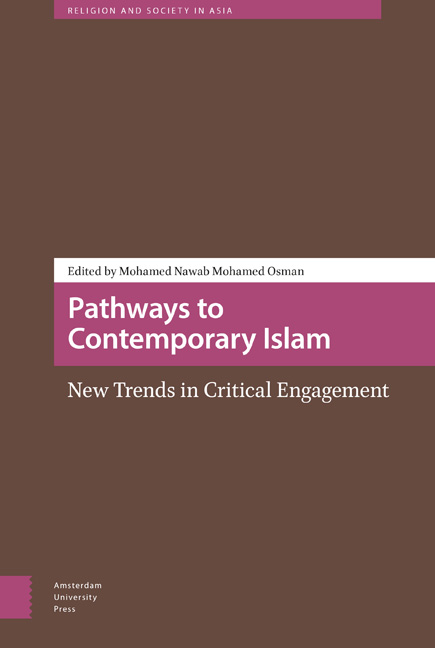Book contents
- Frontmatter
- Dedication
- Contents
- Acknowledgements
- Introduction: Constructing Pathways to Contemporary Islam
- Section 1 Historical Trends in Contemporary Perspective
- Section 2 Contesting the Islamic Intellectual Tradition
- Section 3 Beyond the Arab Revolutions: Political Islam Revised
- Section 4 Contemporary Spaces of Critical Engagement
- Notes on the Contributors
- Index
1 - Pathways to Modern Islam
Published online by Cambridge University Press: 25 November 2020
- Frontmatter
- Dedication
- Contents
- Acknowledgements
- Introduction: Constructing Pathways to Contemporary Islam
- Section 1 Historical Trends in Contemporary Perspective
- Section 2 Contesting the Islamic Intellectual Tradition
- Section 3 Beyond the Arab Revolutions: Political Islam Revised
- Section 4 Contemporary Spaces of Critical Engagement
- Notes on the Contributors
- Index
Summary
Abstract
Modern Islam, in contradistinction to traditionalist or pre-modern Islam, emerged in the mid nineteenth century as a reaction to the overwhelming of Muslim societies by a rapidly expanding Occident. Modern Islam sought to effect the perspectives and consciousness of Muslims by a focus on the political dimension of Muslims’ disempowerment. A number of often conflicting political, doctrinal, and social currents emerged that sought to reposition Islam in its modern context. However, the Modern Islam project has effectively ended and degenerated into an obscurantist exposition of the religion, extreme extenuation of the Shia-Sunni schism, and the growth of a nihilistic and destructive understanding and practice of jihad. Muslims must thus look beyond the false promise of a new Islamic ‘Reformation’ or ‘Enlightenment’.
Keywords: Modern Islam; Reform; Consciousness; State Romantic
Introduction
The tumult of the past half century has revealed a bewildering and shocking transformation of the understanding and practice of Islam, at the private, social, and state levels. What was widely perceived in the 1950s and 60s as a religion in rapid decline in the face of modernization and secularization, and which had been relegated to the margins of power in most Muslim countries, erupted on stage in dramatic fashion. Right from its inception in the seventh century to its march towards becoming a world religion, the evolution of Islam has moved along tracks that crisscrossed, backtracked, advanced, and retreated, while interacting with, or confronting other world or regional systems, and building the scaffolding of its unique world view. These pathways are well-defined tracks that originate somewhere and purportedly end somewhere else. They could intersect other pathways, creating new ones that are continuous with the old or are in fact new directions. All great civilizations, to which Islam is no exception, exhibit some, or all of these characteristics.
An observer examining the unfolding of this centuries old process can discern an order of sorts, one that gives coherence and meaning to the randomness and chaos that often accompanied the events that turned Islam into a world civilization. This is the Islam that most Muslims identify with and seek to recapture its high moments, which will be referred to as pre-modern or traditional Islam.
- Type
- Chapter
- Information
- Pathways to Contemporary IslamNew Trends in Critical Engagement, pp. 27 - 48Publisher: Amsterdam University PressPrint publication year: 2020



